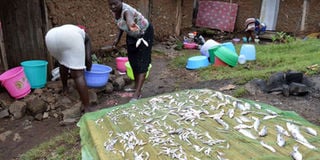Why slum women, girls can't enjoy sexual rights

What you need to know:
- African Conference on Sexual Health and Rights accuses African governments of ignoring slum women's plight
- Some slum women, girls have been raped severally
- African governments must be held accountable on their commitments to promoting gender equality
Dr Uwemedimo Uko Esiet, convener of African Conference on Sexual Health and Rights says African governments are blind to the needs of slum women and girls despite existence of related laws and policies.
“There are several national and regional policies on sexual and reproductive health and rights but we have not distilled these policies to find out which women and girls they are addressing,” he said during the 9th Africa Conference on Sexual Health and Rights (ACSHR) held at Kenyatta International Convention Centre (KICC).
Dr Esiet identified unmarried women and poor mothers as vulnerable groups in the slums.
“Have you ever heard of how unsafe homes of single women are in the slums?” queried the family planning expert.
“They are paying for the room but because everybody knows that this woman lives alone; she cannot sleep with both her eyes closed because she is always trying to be sure nobody is trying to force his way in,” he said while elaborating on how social and economic inequalities are compromising the female gender’s right to SRHR.
RAPED SEVERALLY
“They come in…they have a broken bottle or a knife…she does not want to die. Some of them have been raped severally,” he added.
He said: “I have interacted with them. You hear of cases of sponsors visiting mothers and giving them Sh500 in exchange for the daughter. And she gives her away because the family has to eat.”
The conference convened by African Gender and Media Initiative Trust (GEM) follows the footsteps of last year’s International Conference on Population and Development (ICPD25) in which various commitments were made towards achieving gender equality.
Among them were ensuring universal access to SRHR, zero unmet family planning needs, as well as ensure access to affordable modern contraceptives.
Dr Esiet, however, said African governments should be serious with eliminating prevailing obstacles hindering slum women and girls from accessing and enjoying their rights.
The conference brings together gender equality advocates, civil society and scholars from six African countries to reflect on government’s efforts towards addressing SRHR’s of women and girls in the slums, as well as propose solutions to be presented to the respective governments.
“Let us move from exclusivity to inclusivity…stand up for one another especially for the rights of women and girls. This will lead to us ensuring equality, equity and development in our great continent,” said Dr Esiet.
Ms Gladys Kiio, Program Manager at GEM said African governments must be held accountable on their commitments to promoting gender equality.
“We need to ask ourselves 25 years since the Beijing Conference, have the African nations addressed fully the SRHR needs of woman and girls?” she stated.





